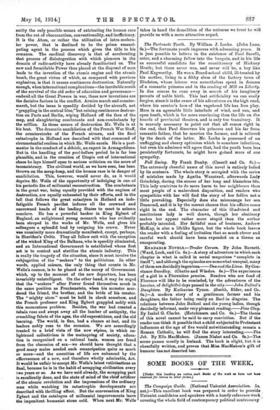The Fortunate Youth. By William J. Locke. (John Lane. 6s.)—The
fortunate youth improves with advancing years. It is just possible to believe in the existence of Paul Savelli, actor, and a charming fellow into the bargain, and in his life as successful candidate for the constituency of Hickney Heath; but there never was, and never will be, a boy like Paul Kegworthy. He was a Board-school child, ill-treated by his mother, living in a filthy slum of the factory town of Bludston, whose leisure was nevertheless spent in dreams of a romantic princess and in the reading of Mal on Liberty. In due course he runs away in search of his imaginary parents of noble birth. This last artificiality we can easily forgive, since it is the cause of his adventures on the high road, where his creator's lore of the vagabond life has free play. Here is an agreeable little interlude of wind, and sun, and open heath, which is far more convincing than the life on the boards of provincial theatres, and is only too transitory. It is scarcely necessary to point out that all comes right in the end, that Paul discovers his princess and his far front romantic father, that he marries the former, and is relieved by the death of the latter. Mr. Locke is possessed of an unflagging and cheery optimism which is somehow infectious, but even his admirers will agree that, had the youth been less persistently fortunate, he might have gained more of our sympathy.










































 Previous page
Previous page